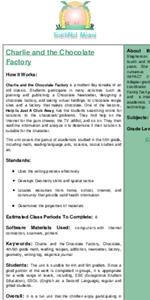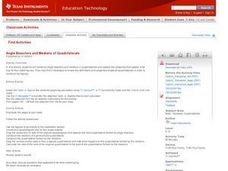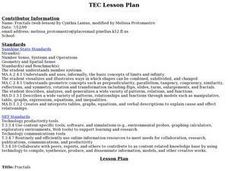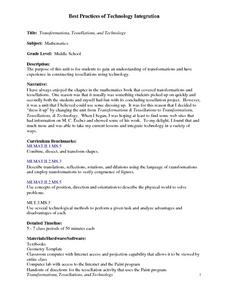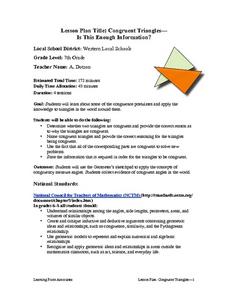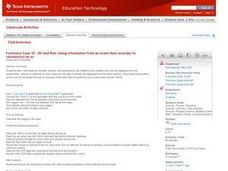Curated OER
Similar Triangles and Proportions
Pupils investigate similar triangles and proportions as they make conjectures about the length of sides of similar triangles. For this lesson, have your class construct similar triangles using Cabri Jr so that they share a common vertex.
Curated OER
Triangle Inequality Theorem
High schoolers investigate the relationship between angle measures and sides of a triangle and the relationships among the three sides of a triangle. The use of technology (Cabri, Jr.) allows learners to make and test conjectures as they...
Curated OER
Charlie and the Chocolate Factory
Fifth graders participate in a variety of math and language arts activities based on chocolate.
Curated OER
Shapes and Colors All Around
Students tour their school in a scavenger hunt to find primary colors and two and three-dimensional shapes. Students take digital pictures of the colors and shapes they find and create a class book of the pictures.
Curated OER
Pythagorean Theorem Spreadsheet
Studetns use a spreadsheet to organize data on the sides of a triangle. They use the Pythagorean Theorem and the If then spreadsheet function to decide whether the three sides determine a right triangle. Young scholars work individual...
Curated OER
Angles, Triangles, Quadrilaterals, Circles and Related
Students classify angles. In this angles lesson plan, students explore the characteristics of angles, triangles, quadrilaterals and circles. They identify polygons and sing a classifying angles song. Students participate in a...
Curated OER
Equations of Circles
Using Cabri Jr. young scholars construct a circle and determine the equation of the circle they drew by finding the center and the radius. Students use the distance formula to derive the equation of their circle.
Curated OER
Shortest Distance Between Points and Lines
Learners use technology to determine the shortest between two points in a plane. They are required to support their analytic explanations with visual illustrations.
Curated OER
Angle Bisectors and Medians of Quadrilaterals
Young scholars investigate the properties of quadrilaterals formed by angle bisectors of a given quadrilateral and quadrilaterals formed by the medians of quadrilaterals. This Cabri Jr. lesson provides opportunity for conjecture and...
Curated OER
What are Fractals?
Middle and high schoolers identify and analyze fractals and research information using the Internet to locate information about them. They look at fractals in relation to nature and other real world situations. Pupils create several...
Curated OER
Picking Pythagoras
Students discover that side measurement is used in determining angle classification of a triangle. By squaring sides, they predict whether triangles be right, obtuse, or acute. They prove the Pythagorean Theorem and use it to solve...
Curated OER
Math and Architecture Lesson
Students examine relationship between architecture and math, explore importance of inventions to humanity and relate math and architecture to their school and home by creating graphs, tables, and presentations showing development of...
Curated OER
Transformations, Tessellations, and Technology
Learners complete a unit about transformations and tessellations. They explore various tessellation websites, determine which shapes tessellate, complete a log about which website activities they complete, and create a tessellation...
Curated OER
Measuring Angles & Segments
Young scholars view a PowerPoint for a warm-up lesson plan. They practice measuring around the classroom, measuring such things as the length and width of a desk, pencil, door, and book. Students use a website to practice measuring angles.
Curated OER
Numbers in Art
Students choose a number from one to twelve and tell a number story about it. They listen to the teacher read "Numbers in Art" by Lucy Micklethwait. Students choose three numbers from one to twelve and view works of art while looking for...
Curated OER
Nature's Polyhedrons
Learners discover the characteristics of polyhedra. Through hands-on activities and interactive videos, students investigate and retrieve information on polyhedra and crystal structures. Learners study angles and symmetry. They...
Curated OER
Congruent Trianges - Is This Enough Information?
Seventh graders determine whether two triangles are congruent and provide an explanation to why they are not. They apply concepts of measurement of angles and collect evidence of congruent angles in the world.
Curated OER
Rep Tiles
Third graders use pattern blocks of one shape at a time to try to create a similar shape. They compare the perimeter of the new figure with the perimeter of the original shape and look for a pattern. Students use the pattern to predict...
Curated OER
Hit and Run
Pupils explore data collection in this instructional activity. They investigate distance vs. time and velocity vs. time graphs using information collected with a CBR 2 to simulate the reconstruction of an accident.
Curated OER
30-60-90 Right Triangles in Cabri Jr.
Young mathematicians draw and label right triangles using Cabri Jr. technology. They create other special right triangles and identify the length of the hypotenuse and each leg. Young scholars explore the ratios to determine how the...
Curated OER
Classifying Triangles by the Length of the Sides Using Cabri Jr.
Learners follow detailed directions to create triangles on their graphing calculator. In this properties of triangles lesson, they will create triangles on their calculators using the Cabri Jr. application. They then identify three...
Texas Instruments
What's the Trig?
Learners determine the trigonometric relationships within a triangle as they construct a right triangle on the Ti-89. They find the sine, cosine, and tangent of various angles of their triangle construction.
Curated OER
Positive and Negative Angles and Arcs
To better understand that the intersection point of two lines lies inside a circle, learners use their keen measurement skills. They discuss arcs, rays, tangent lines, and reflex angles. Then, they put their skills to work as they...
Curated OER
Introduction to Conic Sections
Learners slice cones and identify the different conics formed. They then derive the formula to solve problems involving cones. Pull out the TI calculators to visualize the slicing and the different parts and properties created.


